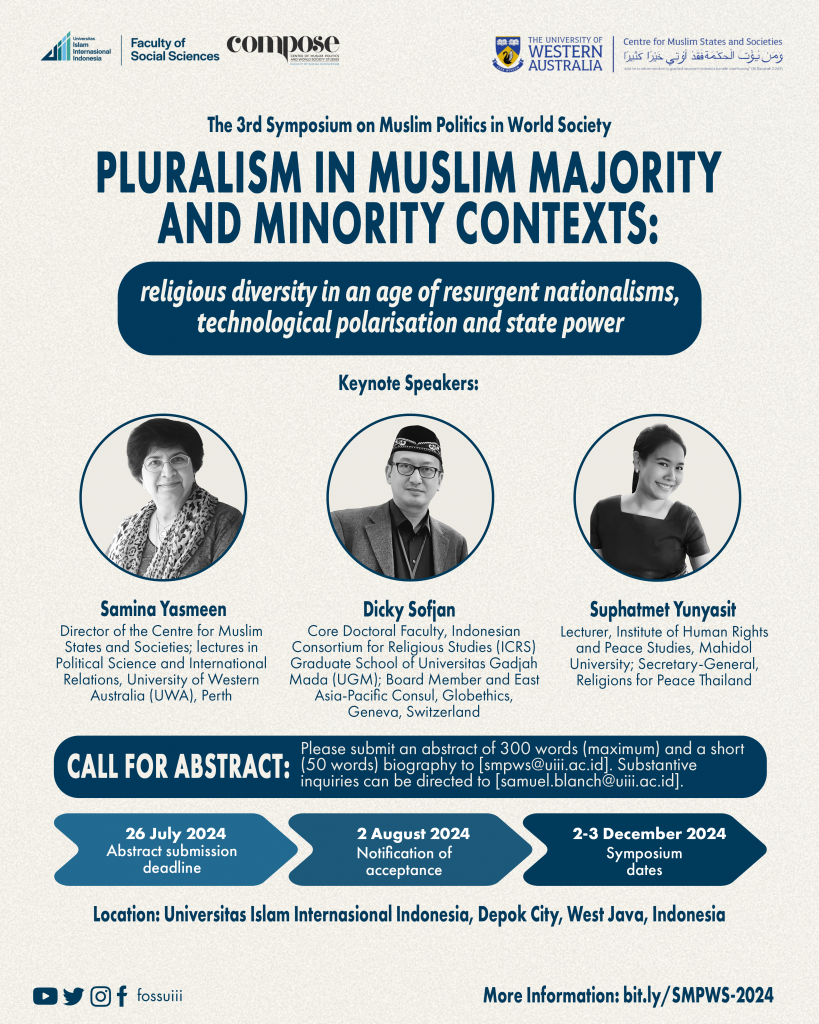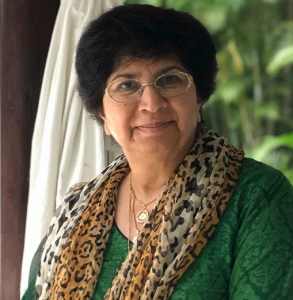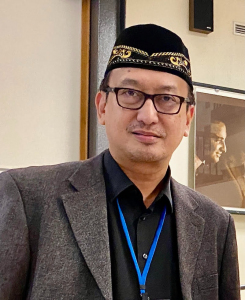Registration for the 3rd Symposium on Muslim Politics in World Society

Call for papers: Pluralism in Muslim majority and minority contexts: religious diversity in an age of resurgent nationalisms, technological polarisation and state power
Deadline for proposals: 26 July 2024
Faculty of Social Sciences, Universitas Islam International Indonesia
Whither religious pluralism
Regimes of surveillance, control, and policing restrict and mandate ‘acceptable’ forms of religion. Resurgent ethno-nationalisms displace ‘undesirable’ forms of allegiance and minority religions. Techno-commercial systems herd societies into patterns of homogeneity, policed by cultures of shame and algorithms of profit. Online mobs pillage sites of difference. Several other global forces also militate against the quality and sustainability of religious practices that do not conform to the dominant cultural and political patterns. Muslims are caught within these processes, sometimes as agents and other times as victims, in both minority and majority contexts. Erupting nationalisms and populisms in some contexts position Muslim populations as marginal or unwanted, while in others, complex interactions between the state and social constituencies, often expressed online, create volatile spaces for minority religious expressions. Awkward emulsions of secular legal tradition and ‘progressive’ political agendas are increasing uncertainty for religious communities both new and old. The long arm of the state reaches ever further.
Symposium Themes
Within this broader context, the overarching objective of the symposium is to explore political, social and cultural conditions that facilitate or threaten religious pluralism. The symposium therefore calls for contributions that will explore the histories, current practices and prospects for religious pluralism, with a special focus on the minority and majority Muslim world, in relation to the following sub-themes:
- Forms of nationalism, both new and old, including their interaction with religion and other forms of community, and as they are expressed and mediated through technology and state power.
- Technological and economic change, including the implications for religious diversity of artificial intelligence, of social media landscapes and ecologies, and of the changing forms, aesthetics and economies of online interaction.
- State agency as expressed through law and governance, including human rights, secularism and other forms of religion-management, multicultural policy and securitisation, as well as surveillance and policing.
Without limiting potential contributions, possible questions might include:
- What kinds of governance arrangements and political cultures facilitate genuine religious pluralism?
- Is the continued technological empowerment of the state a risk to religious diversity?
- Will the global forces of technology and commerce constrain or invigorate the vitality of religious communities?
- In what ways do resurgent forms of nationalism threaten other expressions of religious life?
- Is the logic of the security and surveillance state ultimately incompatible with competing traditions of religious allegiance?
Details
The scale and scope of these questions demand a rich set of voices, disciplinary backgrounds, approaches and methodologies . The quality of our answers to these problems will be enriched by conversations that reach across minority and majority Muslim contexts, from both the global north and south. We are therefore interested in proposals able to engage with these issues with an eye to global, comparative and historical contexts.
- We are interested in proposals engaging with these issues with an eye to global, comparative, and historical contexts.
- We welcome papers from senior graduate students, early career researchers and established academics working across the social sciences and humanities.
- Please submit an abstract of 300 words (max) and a short (50 word) biography to smpws@uiii.ac.id. Substantive inquiries can be directed to samuel.blanch@uiii.ac.id.
- This in-person conference at Universitas Islam Internasional Indonesia, Depok, West Java, requires physical attendance. Registration is free, but no additional financial support will be provided.
Keynote Speakers
Samina Yasmeen

Samina Yasmeen AM is an Australian–Pakistani author and intellectual known for her work on South Asia’s political and strategic development and Islam’s role in world politics. She is a director of the Centre for Muslim States and Societies and lectures in Political Science and International Relations in the School of Social and Cultural Studies, the University of Western Australia (UWA), Perth.
Dicky Sofjan

Dicky Sofjan is from Core Doctoral Faculty in the Indonesian Consortium for Religious Studies (ICRS), which is a consortium of three universities based at the Graduate School in UGM. Thus, the program, Inter-Religious Studies, is an international, interdisciplinary, and interreligious Ph.D. program. Apart from teaching at the Graduate School, he has also been involved in the Educational Exchange Committee of the American-Indonesian Exchange Foundation, which manages the Fulbright scholarship. He is also the Director of the Globethics.net Indonesia Office, located in the UGM Graduate School.
Suphatmet Yunyasit

Suphatmet Yunyasit is a lecturer in the field of conflict and peace studies at the Institute of Human Rights and Peace Studies, Mahidol University, Thailand. She also serves as Secretary-General, Religions for Peace Thailand (RfP Thailand) and a Co-Chair, Asia-Pacific Women of Faith Network (APWoFN), Religions for Peace Asia. Her works focus on Religion and Human Rights in Southeast Asian context, Religion’s Roles in Conflict Transformation and Peacebuilding and Intra and Interreligious Dialogue as Tool for Conflict Transformation.